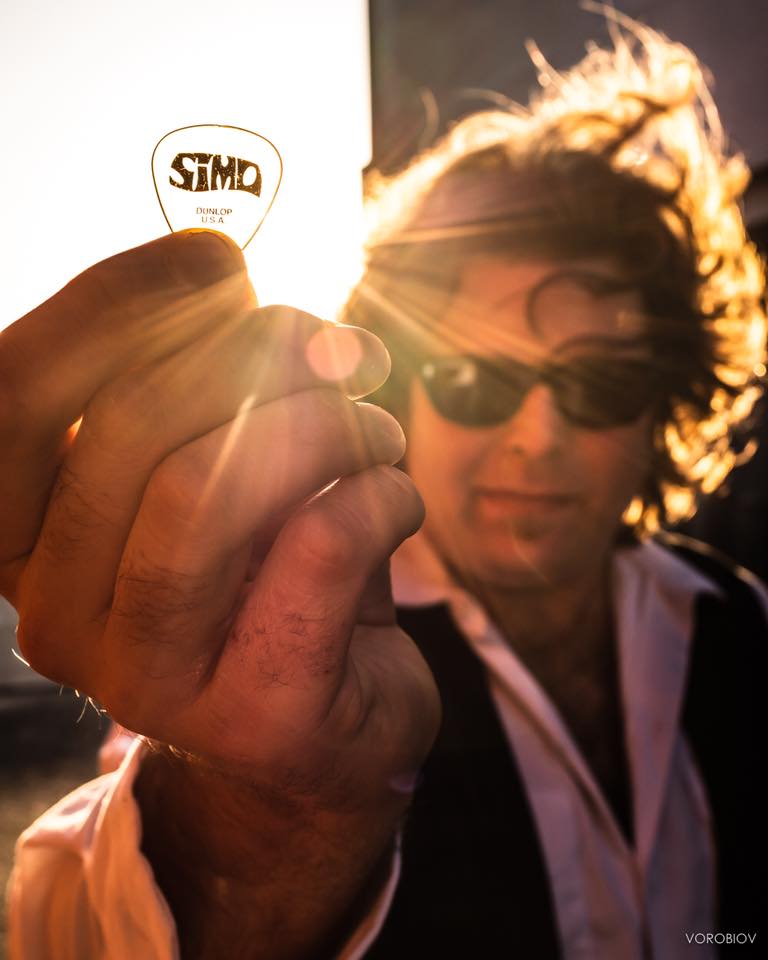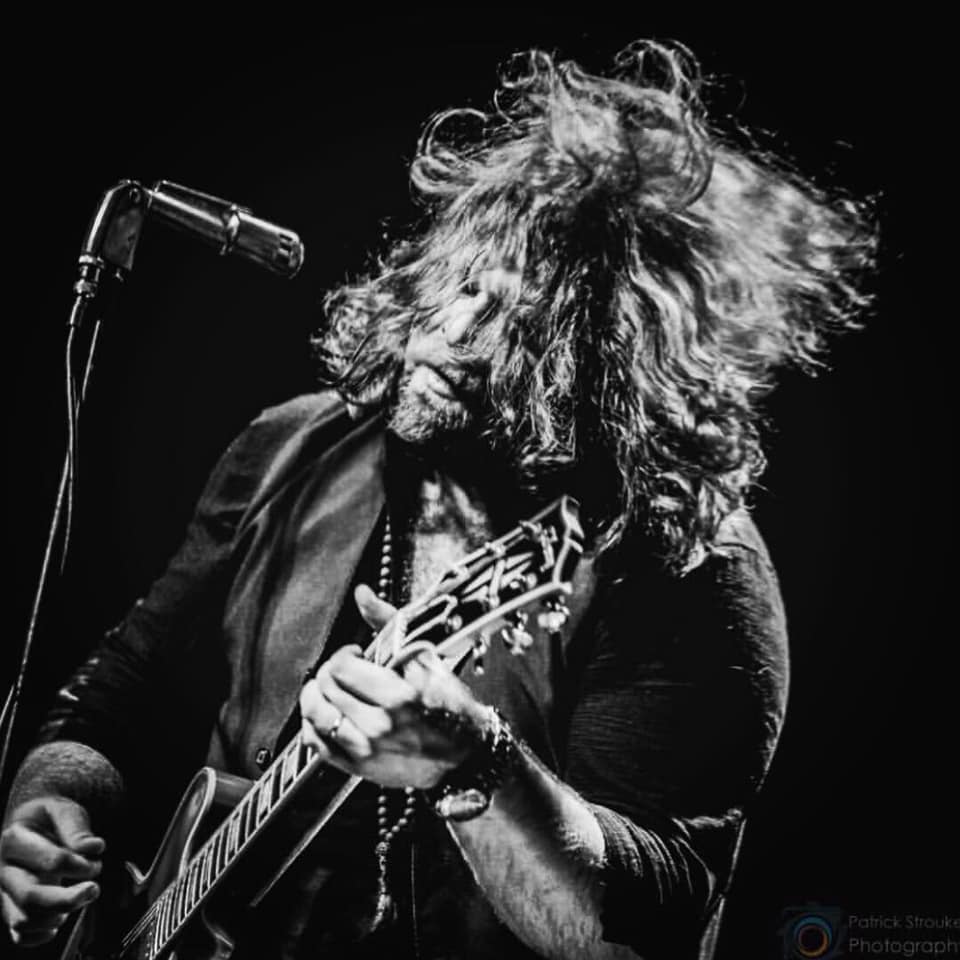It must be a wonderful feeling, for any musician, to be able, at a certain point of their careers, to release music without any form of compromise, letting the instinct and the inspiration to fly free and allowing the artists in question to express in full their musicianship.
This is, in many ways, the kind of feeling that Chicago-born Guitar Prodigy JD Simo is in right now. With a new album under his belt just released and called Off At 11, previously reviewed by our website and already obtaining high praises by the whole of the worldwide Music Press, it's really a magic moment for the guitarist and singer/songwriter.
Bluebird Reviews meets the artist born Jeffrey Daniel Simo in London, United Kingdom, where the Nashville-based artist is supporting fellow Guitar Maestro and personal friend Tommy Emmanuel in a highly successful Worldwide Tour, where Simo has been showcasing, in an electrifying solo set, some of the new songs included in Off At 11 together with covers of old classics and some of the guitarist's previous material. JD Simo appears very happy and relaxed and welcomes our website with his usual courtesy and amiability.
BR - JD, many congratulations on the release of an extraordinary album like Off At 11. It seems almost inconceivable, in these days and era, that a record of this stature can be recorded in just three days. How much have the new songs changed shape since they were originally written and do they reflect, sonically, how did you want to sound initially when you started working on the making of Off At 11?
JDS - Well, some of the songs that have been around for a while, they have changed quite a bit. Like Off At 11, for example, a song that has been around for several years but just never made it on a record, before now and also Accept, the song that closes the album, it is a tune that has been around for many years as well and not been played for few years. Those songs were brought up for the new record, after not have been played for a certain amount of time and re-arranged to a certain extent. Then, some of the other songs, like Mind Trouble, my version of Boom Boom, Out Go The Lights and I Got Love If You Want It, those were the ones that I really wanted to include on the album and showed to Adam (Abrashoff, drummer) and Luke (Easterling, bass), then we managed to cut them really quick. Also the song Temptation has been around for quite a while and what you hear on the album, it is something completely different from how it was originally conceived. In total, as you were saying, it really took few days to record the album but the record has been spaced out over a really long period of time, because I’ve built a studio in my house and when I say “built a studio”, it’s just a funky old little place, probably the size of this room where you and I are chatting, with a bunch of old microphones from the 50’s and it is just the kind of place I wanted to work in. It’s not what you would normally call a Professional Studio, with no headphone mixers, just that kind of funky environment that works perfectly for me. Sonically, I just experimented it over many months, just kind of learning the space and I would invite friends over to record and that is what it kind of turned everything into the album, actually. I had cut dozens of things, as I always do and I had compiled a very Old School 50’s type of Blues album. Mind Trouble was on there, Sweet Little Angel was on there, as there were Temptation and I Got Love If You Want It too plus a bunch of others. Then I went off to do my first batch of shows with Phil Lesh from the Grateful Dead and, at the time, he had already heard the rough mixes of that collection of songs I mentioned to you. When we got on with the gigs, one day I said to him, offhand “Man, you know, I am really happy with this record that I’ve just made but I really like what we just did too now” and then Phil just said to me “Well, you know you can do both, Man” to which point I thought “Yes, of course I could”. What happened, after I got home, was that I cut Off At 11 and Accept, you know, the more jammy songs and saved for the Off At 11 album all the other songs that I thought they would fit in the first place. So, in brief, sonically, it was just me, trying to figure out how to use my studio to the best of its ability but song wise, as I mentioned before, it didn’t take much time to record but it was just spaced out over a certain period of time, something like six months and there was a ton of stuff that I had cut too and not used for the record. Some of that stuff, I am anxious to get back to, because it’s stuff that I like and we are playing live, some other are old songs that people might have never heard of and stuff like that. I love working in that studio and I cannot wait to get back to it.
BR - In some ways, Off At 11 is a concept album. It shows, in my view, the global vision and total appreciation of the definition of music at 360 degrees from an extremely talented artist like you are and, also, it displays through the lyrics of the album a common pattern about love, intended in its most universal meaning and artistic freedom. Do you feel that, by releasing the record via an independent label, you had more opportunity for your music to be expressed in the way that you like the most, the latter being an unconditional freedom of expression?
JDS - Well, that’s just me, in general, you know. That goes back to the first SIMO album. I feel that it is something that is never too far away from me and I guess, some of that is coincidence too. Songs like the Slim Harpo’s I Got Love If You Want It, that it is a tune I really love. It’s just something spontaneous, if there is something that grabs me and I want to do, that is, for me, showing love, as I did for the song I just mentioned. Sometimes I think, “God, I’ve got so many songs with the word Love inside…”. It’s just me, it’s what I feel comfortable with and love is certainly one of those things.

BR - JD, I love the way you credit Blues music as the platform from which the genesis of rock and roll came from. From the purity used in that exquisite rendition of B.B. King's Sweet Little Angel to your own personal touches used on Little Walter's album opener and Slim Harpo's I Got Love If You Want It. How challenging has it been for you to choose the covers that ended up on Off At 11?
JDS - As I was telling you before, there is a huge pile of songs I would like to get to, over time and they were just the ones that seemed to fit together the best, to me on the album. I Got Love If You Want It is a song that we didn’t play live before but I just liked the way that it turned out. Ironically, the Little Walter’s cover Boom Boom Out Go The Lights, it doesn’t sound good live, for some reasons. I am really happy with the version that we recorded, of that song but for some reasons, when we went to rehears it, we just couldn’t nail it as I wanted, so that it’s the one song that we are not playing live. But I always dug the tune and I always wanted to mess around with it and I was happy with the way it turned out. For Sweet Little Angel, I wanted to do a Freddie King or a Magic Sam or a B.B. King song and that was just the one that I was pleased with the take of. There’s a lot more, in terms of songs, that I wanted to try but I’ve never really committed to that on a record before. About Sweet Little Angel, I’ve gotta say that I really like playing slow and quiet like that and it is something that I really love doing.
BR - During the years and by listening to your records, our website has learned to admire and love the fabulous musical alchemy that yourself and Adam Abrashoff on drums have built, through times and so greatly resounding (and shining) as well in all of the album's tunes but to us, in particular, in the final section of the You Need Love's song. What was the original length of this tune, before it got truncated towards the end?
JDS - If I am not mistaken, that song went on forever and we knew that we were gonna put Off At 11 and Accept on the record as well, therefore it was purely a decision to keep that one slightly more concise and why, well, that’s another story! (smiles). In all honesty, we actually had to omit the Boom Boom song from the running order on the vinyl release, because it won’t fit! So, you know, it was mostly a time issue, when it came to the duration of songs like the one you mentioned. Then, also recognizing that, like I said, there’s plenty of jams elsewhere on the record, so we decided to slice off a part of the jam part of You Need Love but trust me, it went on for a long time! (smiles).
BR - JD, do you feel that, given the great reception that your new solo record is receiving worldwide in such a short amount of time since its release, you are likely to release more solo albums in future under your name or have you planned, at some stage, to record again as SIMO but intended as a collective?
JDS - I don’t really intend to record under the SIMO name, intended as a collective, anymore. What that initially was, it was a band that Adam, myself and Frank (Swart) the original bass player formed and then, when we signed the first record deal and Elad (Shapiro, who replaced Frank Swart on bass) joined, it felt like we were a band. It was all very democratic or, at least, I did my darndest to try and make it be as democratic as I could, you know. But it just feels to me now that it was a chapter that has been done and finished. Mine and Adam’s relationship is bigger than a band name, you know; besides, I don’t really see myself and Adam not making music together and Adam completely understands where I am coming from. There’s enough friendship and mutual respect between the two of us and he is always down for whatever it is that I want to do, to certain extents. I am certainly going to continue to make records under my own name. But there are other projects looming, like, myself and Luther Dickinson already half a way through making a record together and there are some other relationships, through Phil Lesh, that we may or we may not get it together to do some stuff. So, you know, I guess time will tell.
BR - Historically, every great album that defines a music era like Off At 11 does, provides a mesmerizing closing tune and your new record is no exception. The song Accept, in that respect, summarizes not just your incredible talent as an artist but opens up also to interpretations about your idea of how life and music should be lived. Paraphrasing the song's lyrics, how long does it take, not just for you but for any music artist, to accept the concept of "accept what you've got but don't settle for what is not"?
JDS - I guess that it is up to every individual, you know. For me, I just feel that, in the last year, I am starting to feel more comfortable in my own skin and I have to partly thank also Tommy (Emmanuel) for that, because it wasn’t until I walked away from the band (SIMO) and walked into a completely foreign environment, playing alone, that it began to be more clear to me what is that I really love, what is it that I really like, what is that I really enjoy doing. And that kind has continued into where I am right now. I don’t think that some people ever get there, in that state of mind, sometimes. Some people get there quick, some people takes a very long time, some people don’t get there at all. There is a certain amount of surrender involved and I think that it’s very depending upon a person’s ability to be able to step away and be hats-off critical and honest with themselves, about what it is that they are or they are not or could be. Like I said before, there was a lot of that for me, when I walked away from it, looking at how hard I worked on an album like Rise And Shine (the 2017 SIMO album) and how long it took for me to get over from things like, for instance, the whole effort that I put in certain aspects of that album, something that I was really proud of but then having to alter such aspects so much in order to appease others. That was something that, you know, I wish I would have done in the way that I wanted to do in the first place. But that is the beauty of making records, I guess; you can always make another one!


